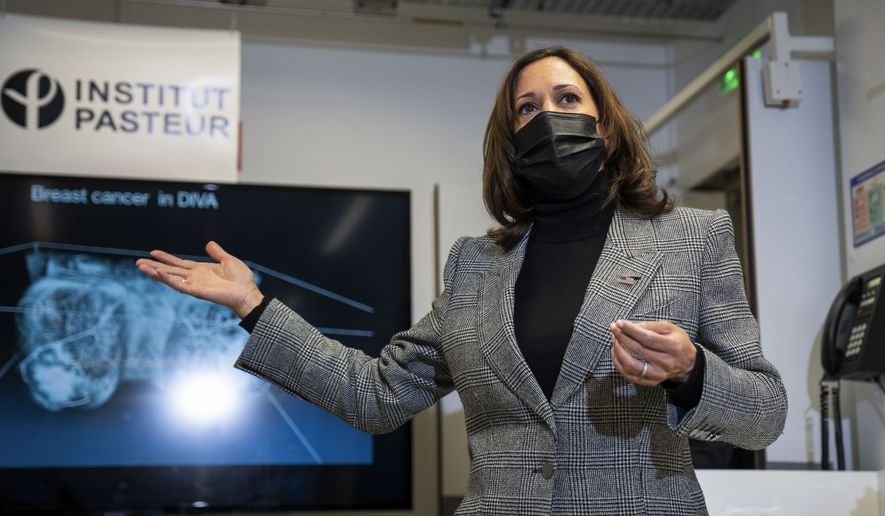Vice President Kamala Harris arrived in Paris early Tuesday to work with French President Emmanuel Macron on climate change and the COVID-19 fight and further ease the ruckus over a submarine deal with Australia that irked France.
“We are focused on looking forward, not looking backward. France is one of the United States’s oldest and strongest allies,” Symone D. Sanders, a senior adviser and chief spokeswoman for Ms. Harris, told reporters en route to Orly Airport. “If we are going to tackle our global health challenges and prevent the next pandemic, we have to do this together.”
Ms. Harris said it was “good to be in France” as she touched down with her husband, Doug Emhoff.
“I am looking forward to many, many days of productive discussions reinforcing the strength of our relationship,” she said after her motorcade winded along the Seine River and past the Eiffel Tower.
Ms. Harris will use the five-day visit to focus on the plight of migrants and refugees in a meeting about Libya with other world leaders. She will also meet with Mr. Macron and other leaders on the sidelines, will speak at the Paris Peace Forum and participate in an Armistice Day ceremony.
Aides have described the vice president’s trip as important for U.S. alliances and crucial to addressing gender equality and “rising inequality” around the world, though it also serves as a chance to raise her profile and approval ratings that have dropped to as low as 28% amid criticism of her handling of the migrant crisis at the southern U.S. border and fallout from the U.S. exit from Afghanistan.
SEE ALSO: Harris jets off to France with record-low approval rating, lower expectations
The trip comes less than two weeks after President Biden told Mr. Macron the U.S. was “clumsy” in its handling of a nuclear-powered submarine deal with Australia. The French said the deal was struck without their knowledge, depriving them of contracts worth billions because the Australians walked away from a prior deal with their sub manufacturers.
Ms. Harris started her visit Tuesday with a tour of The Pasteur Institute, a nonprofit scientific foundation that is tracking variants of the coronavirus in Africa.
James Philip Di Santo, professor of immunology at the institute, said they were also trying to understand why people have different symptoms and outcomes from COVID-19. Their research involved plenty of nasal swabs, prompting Ms. Harris to note she was “intimately familiar” with testing protocols.
The vice president and researchers found common ground over cancer research. Ms. Harris’ mother, Shyamala Gopalan, was a noted scientific researcher who did work at the Pasteur facility in the 1980s.
“This is really impressive. It’s come so far,” she said. “The breakthroughs that [my mother] was responsible for in the ’80s [were] the basis for a lot of great work.”
Ms. Sanders said the vice president is mindful of action back home in Washington during her trip.
Ms. Harris worked the phones late Friday and Saturday to rally support for Mr. Biden’s spending plans as the focus shifts to a social-spending bill. A parallel infrastructure bill passed at the start of the weekend.
“She’s going to continue to be actively engaged on that but obviously she has a full schedule here in France,” Ms. Sanders said.
Speaking to reporters at the foundation, Ms. Harris didn’t address the social bill directly but expounded on the nature of policymaking.
She compared it to lab experimentation or a kitchen recipe — if you use too much salt the first time, you should reevaluate to get it right the next.
“There will be glitches, and there will be mistakes,” she said. “If you don’t make the same mistake twice … that’s a good process and we should encourage it.”
• Dave Boyer contributed to this report.
• Tom Howell Jr. can be reached at thowell@washingtontimes.com.




Please read our comment policy before commenting.